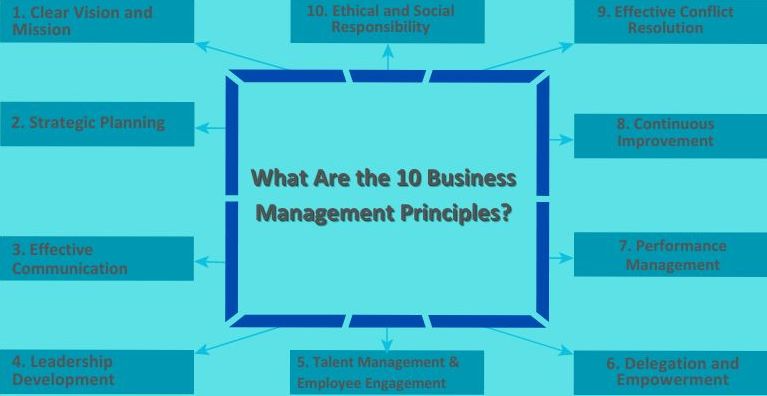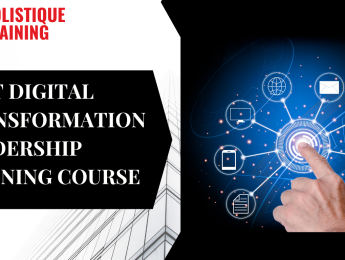- Table of Contents
- Introduction
- What Is Business Management?
- What Are the 10 Business Management Principles?
- 1. Clear Vision and Mission
- 2. Strategic Planning
- 3. Effective Communication
- 4. Leadership Development
- 5. Talent Management and Employee Engagement
- 6. Delegation and Empowerment
- 7. Performance Management
- 8. Continuous Improvement
- 9. Effective Conflict Resolution
- 10. Ethical and Social Responsibility
- How to Effectively Implement Them at Your Workplace
- Assess Current Practices
- Develop an Implementation Plan
- Provide Training and Resources
- Lead by Example
- Foster a Culture of Learning
- Monitor Progress and Adapt
- Challenges in Business Management
- Adapting to Market Changes
- Managing Financial Constraints
- Attracting and Retaining Talent
- Effective Leadership and Team Dynamics
- Technological Integration and Security Concerns
- Global Expansion and Cultural Differences
- Balancing Quality and Efficiency
- Regulatory Compliance and Ethical Considerations
- The Role of Technology in Business Management
- Integrating Project Management Software
- Harnessing Data Analytics for Informed Decision-Making
- Embracing Cloud-Based Solutions for Flexibility
- Implementing Customer Relationship Management (CRM) Systems
- Enhancing Cybersecurity Measures
- Adopting Artificial Intelligence (AI) and Machine Learning (ML)
- Ensuring Mobile Accessibility
- Becoming Better at Business Management: The Essential Steps
- 1. Seek Learning Opportunities
- 2. Solicit Feedback
- 3. Develop Emotional Intelligence
- 4. Network and Collaborate
- 5. Reflect and Learn from Mistakes
- Conclusion
Introduction
Effective business management is the cornerstone of organisational success. It involves orchestrating resources, people, and processes to achieve goals, maximise efficiency, and foster growth. Whether you're a seasoned executive, an aspiring entrepreneur, or a team leader, understanding and implementing sound business management principles is essential to driving results and creating a thriving work environment. This blog post will delve into ten fundamental business management principles and provide actionable insights on applying them effectively in your workplace.
What Is Business Management?
Business management refers to the set of practices and strategies used to plan, organise, lead, and control a company or organisation's operations. It encompasses various aspects, including decision-making, resource allocation, goal setting, and team coordination. Effective business management involves leveraging available resources efficiently to achieve organisational objectives while fostering an environment that encourages growth, innovation, and employee development.
Skill | Description | Impact on Management |
Leadership | Inspires, guides and empowers teams | Positive work culture, high mora |
Communication | Clear, open and effective exchange of ideas | Enhanced collaboration, reduced misunderstanding |
Decision Making | Strategic choices based on analysis and intuition | Informed strategies, risk mitigation |
Problem-solving | Analytical thinking to resolve complex issues | Efficient troubleshooting, innovative solutions |
Adaptability | Flexibility in response to changing situations | Swift adjustments, resilience in dynamic markets |
Table 1: Essential skills for effective business management
What Are the 10 Business Management Principles?
1. Clear Vision and Mission
A clear vision and mission act as the guiding light for any organisation. The vision outlines the future state the company aspires to, while the mission defines its purpose and how it aims to achieve the vision. These statements not only motivate employees but also provide a framework for decision-making. They create a sense of purpose, aligning the efforts of every individual within the organisation toward common goals. Implementing this principle involves involving employees in the formulation process, ensuring that the statements resonate with the organisational culture, and regularly revisiting them to ensure relevance.
2. Strategic Planning
Strategic planning is the backbone of organisational success. It involves a systematic process of envisioning a desired future and translating this vision into broadly defined objectives and a sequence of steps to achieve them. This principle necessitates a keen understanding of the market, competitors, and internal capabilities. Regular evaluations and adjustments are vital to ensure the strategy remains aligned with the dynamic business environment.
3. Effective Communication
Communication is the cornerstone of effective management. It involves articulating ideas clearly and ensuring that the message is understood. In business, communication should be open, transparent, and timely. It can take various forms, including verbal, written, or non-verbal communication. Employing a mix of communication channels, both formal and informal, ensures that information flows seamlessly throughout the organisation. Active listening, a crucial component of effective communication, fosters mutual understanding and trust among team members.
4. Leadership Development
Leadership is not merely a position; it's a set of skills and attributes that inspire and guide others. Leadership development programmes are essential for nurturing these skills among managers. These programmes often include decision-making, conflict resolution, emotional intelligence, and strategic thinking training. Effective leaders create a positive work environment, motivate employees, and drive innovation. Encouraging a leadership culture at all levels empowers employees to take initiative and contribute proactively.
5. Talent Management and Employee Engagement
Attracting and retaining top talent is a competitive advantage. Talent management involves identifying key positions, recruiting suitable candidates, and providing continuous training and development opportunities. On the other hand, employee engagement is about creating a workplace where employees are emotionally committed to their roles and the organisation's objectives. This principle emphasises the importance of recognising and rewarding achievements, fostering a healthy work-life balance, and providing avenues for career growth. And this has proven its effectiveness time and time again. For example, according to ZipDo, organisations implementing a robust employee recognition programme experience a 31% decrease in voluntary turnover rates. Also, employees who maintain a healthy work-life balance demonstrate a 21% increase in productivity levels, according to Toner Buzz.
6. Delegation and Empowerment
Delegation is more than just assigning tasks. It involves entrusting responsibility, granting authority, and creating accountability. Effective delegation lightens the managerial load and promotes employee skill development. Empowerment takes delegation a step further by allowing employees to make decisions within their roles. Empowered employees feel a sense of ownership, leading to increased job satisfaction and innovation.
7. Performance Management
Performance management is a continuous process that involves setting clear expectations, providing feedback, and evaluating results. It includes regular performance reviews, coaching sessions, and recognition of achievements. This principle requires managers to proactively identify performance gaps and provide the necessary support and resources to bridge them. A merit-based reward system reinforces positive behaviour and motivates employees to excel.

8. Continuous Improvement
A culture of continuous improvement emphasises the importance of innovation, learning, and adaptability. Employees are encouraged to identify inefficiencies, propose solutions, and implement best practices. It fosters a mindset where mistakes are seen as learning opportunities rather than failures. Continuous improvement also involves knowledge-sharing initiatives, encouraging employees to learn from each other's experiences, and implementing feedback loops to track the impact of changes.
9. Effective Conflict Resolution
Conflict is an inevitable part of any workplace. Developing effective conflict resolution skills helps managers address and resolve conflicts constructively. Encouraging open dialogue, active listening, and seeking win-win solutions fosters a harmonious work environment and strengthens relationships among team members. It would be helpful to provide your team with conflict resolution training, as a survey conducted by CPP Global showed that a whopping 95% of contributors, upon receiving conflict resolution training, said that it helped them with their conflicts.
10. Ethical and Social Responsibility
Ethical conduct and social responsibility are integral to building stakeholder trust and ensuring long-term success. Ethical decision-making involves considering the impact of actions on all stakeholders, including employees, customers, and the community. It requires transparency, integrity, and a commitment to legal and moral standards. Social responsibility goes beyond profit-making and involves contributing positively to society. This can include environmental conservation efforts, supporting community initiatives, or promoting ethical supply chain practices.
Understanding and applying these principles in harmony can transform a business. Each principle is interconnected, and effective implementation often requires a multifaceted approach. By embracing these principles, organisations can create a resilient foundation for growth, innovation, and ethical business practices, ensuring their relevance and success in the ever-evolving global market.
How to Effectively Implement Them at Your Workplace
Implementing business management principles requires a systematic approach and commitment from leadership. Here are some steps to effectively implement these principles in your workplace:
Assess Current Practices
To initiate the journey toward effective business management, it's essential to assess your current practices thoroughly. This evaluation should identify strengths, improvement areas, and potential roadblocks. Engaging employees and seeking their input during this assessment can provide a holistic perspective that helps identify areas needing change or enhancement.
Develop an Implementation Plan
After the assessment, the next crucial step is to create a comprehensive implementation plan. This plan should outline specific actions, responsibilities, and timelines for implementing each principle. Moreover, it should align with the organisation's strategic objectives, ensuring that the principles are integrated seamlessly into the overall business strategy.
Provide Training and Resources
Investment in training programmes is essential to equip both managers and employees with the necessary skills and knowledge to effectively implement the principles. Additionally, providing access to resources, such as software tools or external consultants, can facilitate implementation, particularly when specific expertise is required.
Lead by Example
Leadership commitment is the linchpin of successful implementation. Leaders should demonstrate the desired behaviours and consistently uphold the principles in their own actions and decisions. When leaders set an example, it creates a culture where these principles are not just words on paper but living values that everyone in the organisation embraces.
Foster a Culture of Learning
Encouraging a culture of continuous learning and development among employees is paramount. By offering opportunities for skill-building, providing mentoring or coaching programmes, and creating platforms for knowledge sharing and collaboration, organisations can cultivate an environment where employees are motivated to learn and apply new skills.
Monitor Progress and Adapt
Continuous monitoring and adaptation are crucial for ensuring the sustained effectiveness of the implemented principles. Regularly reviewing progress, gathering feedback, and making adjustments as needed enable organisations to stay agile and responsive to emerging challenges and opportunities. Flexibility and a willingness to adapt are key to long-term success.
Incorporating these steps into your organisational practices will help you successfully implement business management principles. The journey requires commitment, but the rewards for improved efficiency, employee engagement, and overall organisational success are well worth it.
In summary, implementing business management principles effectively involves thorough assessment, strategic planning, adequate training, leading by example, fostering a learning culture, and ongoing adaptation. This multifaceted approach ensures that the principles become ingrained in the organisation's DNA, driving sustained growth and success.
Challenges in Business Management
While business management principles provide a solid framework for success, navigating the intricate world of modern commerce is not without its challenges. Understanding and overcoming these hurdles are essential for sustainable growth and organisational resilience. Here are some significant challenges faced by businesses and effective strategies to tackle them:
Adapting to Market Changes
The business landscape continually evolves due to technological advancements, economic shifts, and changing consumer preferences. Organisations need to stay agile and adaptive. Regular market research, keeping an eye on industry trends, and fostering a culture of innovation can help businesses anticipate changes and proactively respond to them.
Managing Financial Constraints
Financial challenges, such as budget constraints, cash flow issues, and unexpected expenses, can hinder business operations. Effective financial management is essential, including prudent budgeting, monitoring cash flow, and exploring diverse funding options. Businesses should also consider cost-cutting measures without compromising quality or customer satisfaction.
Attracting and Retaining Talent
The competition for skilled professionals is intense. Attracting and retaining top talent requires competitive compensation packages, a positive work culture, opportunities for career development, and employee recognition programmes. Investing in training and development can also enhance employee skills and loyalty.
Effective Leadership and Team Dynamics
Leadership challenges, such as decision-making under pressure and managing diverse teams, are common. Effective leadership development programmes, regular team-building activities, and fostering open communication channels can mitigate these challenges. Leaders should lead by example, displaying the qualities they expect from their teams.
Technological Integration and Security Concerns
While technology offers numerous benefits, integrating new systems and ensuring data security can be challenging. Thoroughly researching technology solutions, providing comprehensive employee training, and investing in cybersecurity measures are crucial. Regular updates and audits of technology systems are necessary to identify and address vulnerabilities.
Global Expansion and Cultural Differences
Expanding businesses globally introduces complexities related to diverse cultures, regulations, and market nuances. Thorough market research, cultural sensitivity training for employees, and forming partnerships with local experts can help navigate these challenges. Understanding and respecting cultural differences is essential for effective communication and relationship-building.
Balancing Quality and Efficiency
Efficiency is vital for competitive advantage, but not at the cost of quality. Striking the right balance between efficiency and maintaining high-quality standards requires continuous process optimisation, employee training, and regular quality assessments. Businesses should seek feedback from customers and employees to identify areas for improvement.
Regulatory Compliance and Ethical Considerations
Adhering to regulations and ethical considerations is non-negotiable. Regular updates on legal requirements, ethical employee training, and establishing a robust compliance framework are essential. Ethical decision-making should be integrated into the organisational culture and reflected in all business practices.
Addressing these challenges requires a proactive and strategic approach. By acknowledging these hurdles and implementing targeted strategies, businesses can not only overcome obstacles but also turn them into opportunities for growth and improvement.
The Role of Technology in Business Management
In the rapidly evolving world of business management, technology plays a pivotal role in enhancing efficiency, fostering innovation, and ensuring sustainable growth. Here’s what organisations can do to leverage technology nowadays:
Integrating Project Management Software
Implementing advanced project management software like Trello, Asana, or Microsoft Project enhances task organisation and collaboration. These tools facilitate efficient task allocation, real-time progress tracking, and centralised communication. By providing a bird' s-eye view of ongoing projects, managers can make informed decisions and ensure that the team stays on track, meeting deadlines effectively.
Harnessing Data Analytics for Informed Decision-Making
Data analytics tools like Tableau and Power BI enable businesses to transform raw data into meaningful insights. These tools reveal patterns, trends, and correlations by processing vast datasets, allowing managers to make data-driven decisions. Whether understanding customer behaviour, optimising supply chain operations, or predicting market trends, data analytics empowers businesses to strategise effectively and stay ahead of the competition.
Embracing Cloud-Based Solutions for Flexibility
Cloud computing has revolutionised how businesses store, access, and share data. Cloud-based solutions offer scalability and flexibility, allowing businesses to adjust their resources according to demand. Platforms like Google Workspace and Microsoft 365 provide collaborative environments where employees can work on documents in real-time, fostering seamless communication and increasing overall productivity.
Implementing Customer Relationship Management (CRM) Systems
CRM systems like Salesforce and HubSpot streamline customer interactions and improve relationships. These platforms consolidate customer data, allowing businesses to better understand their audience. With automated follow-ups and personalised communication features, CRM systems enhance customer engagement, increase sales, and contribute to long-term customer loyalty.
Enhancing Cybersecurity Measures
In an age of digitalisation, cybersecurity is paramount. Businesses must invest in robust cybersecurity measures to protect sensitive data and maintain customer trust. Implementing firewalls, encryption, multi-factor authentication, and regular security audits are essential steps. Additionally, educating employees about cybersecurity best practices is crucial in mitigating the risks associated with cyber threats.
Adopting Artificial Intelligence (AI) and Machine Learning (ML)
AI and ML technologies offer unprecedented opportunities for business growth. AI-powered chatbots provide instant customer support, enhancing customer satisfaction. ML algorithms can analyse vast datasets to predict market trends and customer preferences, enabling businesses to tailor their offerings effectively. Moreover, automating repetitive tasks through AI reduces operational costs and allows employees to focus on more strategic, value-added activities.
Impact Area | Description | Benefits |
Data Analysis | Advanced algorithms process vast datasets | Informed decision-making, predictive insights |
Process Automation | Automates repetitive tasks, enhancing efficiency | Time savings, reduced errors, cost-effectiveness |
Customer Engagement | AI-driven chatbots offer instant customer support | Enhanced customer satisfaction, 24/7 availability |
Predictive Analytics | Predicts market trends and customer behaviour | Strategic planning targeted marketing campaigns |
Operational Efficiency | Optimises resource allocation and workflow management | Reduced wastage, streamlined operations, cost savings |
Table 2: Impact of AI on business management
Ensuring Mobile Accessibility
In the age of smartphones and tablets, ensuring mobile accessibility to business tools is vital. Mobile apps and responsive web designs enable employees to stay connected and manage tasks on the go. This accessibility enhances productivity and promotes flexibility in work arrangements, contributing to a positive work-life balance.
By integrating these technological advancements into their business strategies, organisations can achieve higher efficiency, agility, and innovation. Technology serves as a catalyst, propelling businesses into the future and ensuring their competitiveness in a rapidly changing global market.
Becoming Better at Business Management: The Essential Steps
Becoming a proficient business manager is not a destination but an ongoing journey of self-improvement and skill enhancement. Here are essential steps to enhance your management skills and become a more effective and impactful leader:
1. Seek Learning Opportunities
The business landscape is constantly evolving. Attending seminars, workshops, or industry conferences can provide valuable insights into the latest management trends and best practices. Continuous learning keeps you updated on emerging technologies, innovative strategies, and evolving market demands. Consider enrolling in formal management courses or pursuing relevant certifications to deepen your knowledge and gain a competitive edge.
2. Solicit Feedback
Feedback is a powerful tool for personal and professional growth. Actively seek feedback from your team, peers, and superiors. Constructive criticism offers valuable insights into your strengths and areas for improvement. Use this feedback as a foundation for self-reflection and refining your management approach. A willingness to learn from both successes and setbacks is a hallmark of effective leadership.
3. Develop Emotional Intelligence
Emotional intelligence (EQ) is the ability to recognise, understand, and manage your emotions and the emotions of others. Developing high EQ is crucial for effective management. It enables you to navigate complex interpersonal relationships, handle conflicts empathetically, and inspire your team. Enhancing your self-awareness, empathy, and interpersonal skills allows you to build strong and trustful relationships, fostering a positive work environment.
4. Network and Collaborate
Engaging with other professionals in your field through networking events, professional associations, or online communities can broaden your horizons. Networking provides opportunities to exchange ideas, share experiences, and gain fresh perspectives. Collaborating with peers on projects or initiatives can expose you to different management styles and innovative approaches. Learning from the experiences of others can inspire creative problem-solving and expand your management toolkit.
5. Reflect and Learn from Mistakes
Embrace a growth mindset that views setbacks as learning opportunities. Reflect on past experiences, both successes and failures and identify lessons learned. Analyse the factors contributing to the outcomes and consider what could have been done differently. Applying these lessons to future situations enhances your decision-making abilities and equips you to navigate similar challenges more effectively. Embracing a culture of continuous improvement within your team encourages innovation and resilience in the face of adversity.
In summary, becoming better at business management is not a one-time achievement but a continuous process of learning, adapting, and refining your skills. By seeking learning opportunities, actively seeking feedback, developing emotional intelligence, networking with peers, and learning from mistakes, you can enhance your management abilities and become a more effective leader. Remember, embracing a growth mindset and a commitment to lifelong learning are the cornerstones of becoming a truly exceptional business manager.
Conclusion
Business management principles serve as a compass for leaders and managers to navigate the complexities of the modern business world. By embracing and implementing these principles effectively, organisations can create a culture of excellence, foster employee engagement, and drive sustainable growth. Remember, successful business management is a continuous journey of learning, adapting, and refining your skills to meet the evolving needs of your organisation and the dynamic market landscape.
If you're eager to fast-track your progress and equip yourself with the most comprehensive and advanced tools in business management, look no further than our ‘In-Depth Business Management Professional Training’ course. Designed by industry experts, this course is meticulously crafted to empower aspiring leaders and seasoned professionals alike. Gain in-depth insights into strategic planning, leadership development, advanced technology integration, and much more. With hands-on modules, real-world case studies, and personalised mentoring, this course transforms theoretical knowledge into practical expertise. Don't just manage; lead, innovate, and excel! Enrol now and embark on a transformative learning experience that will elevate your business management skills to unprecedented heights.
























